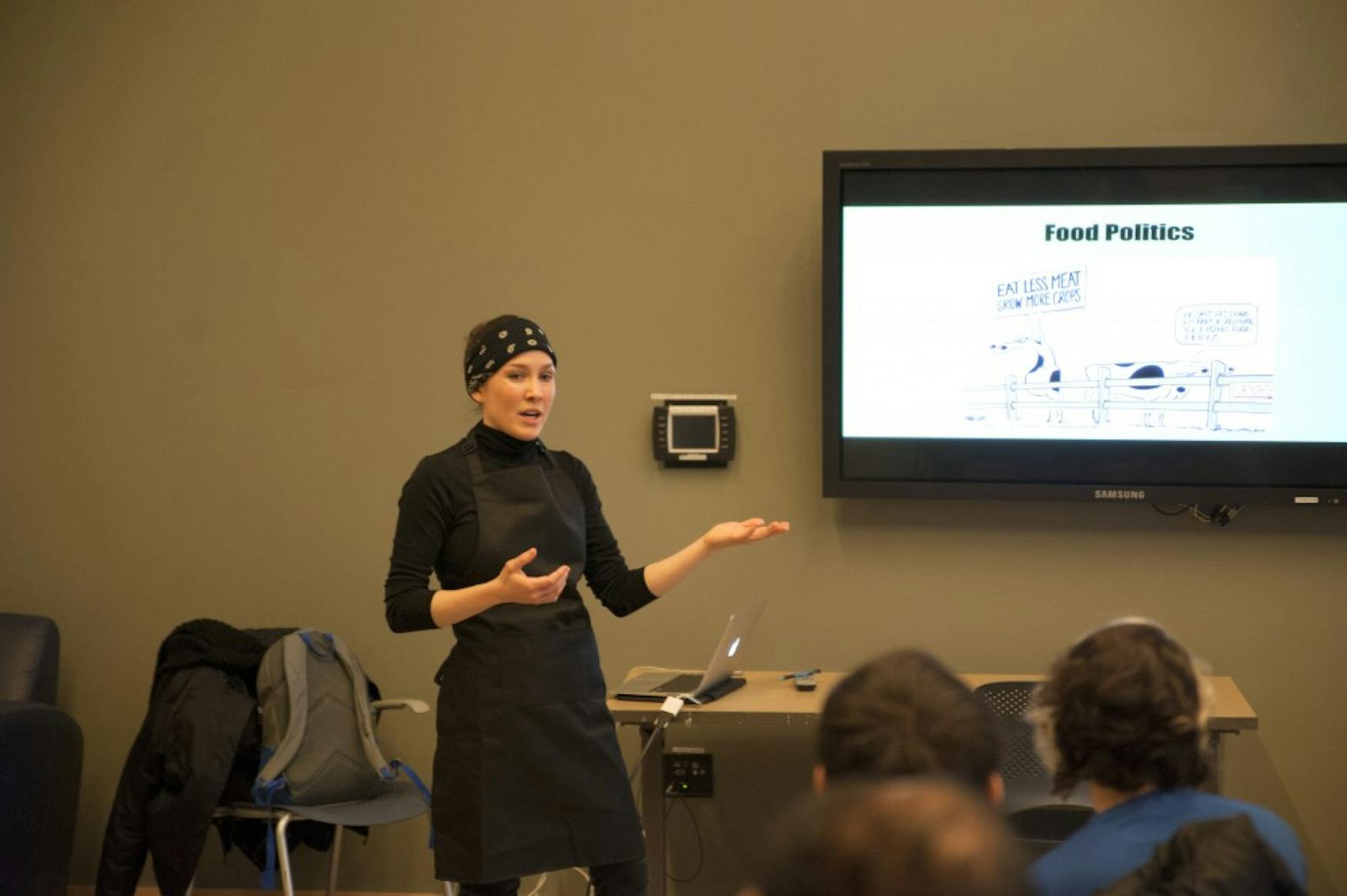Chef discusses health benefits from veganism
Just a few decades ago, vegetarianism and veganism were fringe movements, and mainstream grocery stores rarely sold meat- and dairy- substitute products. Today, however, foods like almond milk, veggie burgers and “cheese” made from nuts can be found in the average supermarket.
Even though these products are now widely available, most people shun plant-based diets for financial reasons or because they have not grown up with it. With its ’DEIS Impact event, “Social Justice On Your Plate,” Brandeis Veg Club sought to change the way Americans think about food and to show that plant-based diets can be tasty while being healthier for the environment and for humans.
The club brought vegan chef Cayla Mackey to talk about problems in the manufacture of animal products and to cook various vegan foods for attendees to sample. Mackey first became involved with vegan food when she completed the American Humane Association’s “Humane Table” program, which, according to its website, encourages people to “celebrate food from animals that have been ethically raised according to standards that are based in science and best practices.” Since then, Mackey has run a vegan restaurant in Providence, Rhode Island, and recently became “REAL Food” certified, aiming to give customers sustainable, ethically-raised food.
After introducing herself, Mackey gave a talk about human and animal rights violations in the meatpacking, seafood and leather industries, and also laid out the harms of eating a meat- and- dairy-heavy diet. Citing the World Animal Foundation, Mackey began her presentation by stating that animal agriculture is the primary cause of species extinction. The side effects of farming, including deforestation and ocean dead zones created by fertilizer runoff, contribute respectively to habitat destruction and hypoxia, which are lethal to animals.
Next, Mackey turned to the human cost of animal product manufacture. She showed attendees pictures of leather tanneries. These showed workers laboring with toxic chemicals and heavy metals, which are used in the production process. Mackey added that these chemicals run off into the water supply, tainting it with carcinogenic chemicals and posing a risk for dangerous diseases.
In the meatpacking industry, Mackey said, conditions for workers are poor. These workers are often first-generation immigrants and are barred by their companies from speaking out about their working conditions. Similarly, according to “Hidden Chains: Forced Labor and Rights Abuses in Thailand’s Fishing Industry,” a January Human Rights Watch report which Mackey referenced, Thai fishing companies exploit migrant workers, often paying them indecent wages and keeping the crews out at sea for months at a time. A January NPR article summarizing the report details how until recently, migrant workers were not counted on crew lists; thus, human rights violations against them could not be investigated.
Mackey then turned to the health problems associated with excessive meat and dairy consumption. The Standard American Diet ingrained in American culture, Mackey stated, is heavily dependent on meat, carbohydrates and dairy. To emphasize the extent to which Americans eat the SAD, she referenced the U.S. Department of Agriculture’s food pyramid’s role in childhood nutritional education. The food pyramid advocates for most of the diet to be comprised of grains, supplemented by a generous helping of meat or poultry and dairy.
Though the SAD is calorically rich, because of the excessive meat and dairy consumption it recommends, Mackey said those who eat it are at far greater risk for diabetes, heart disease, cancer and obesity. Humans are not supposed to eat like this, according to Mackey, and should instead consume larger portions of fruits and vegetables in lieu of meat and dairy. She added that people can get the same nutrients found in meat and dairy from fruits and vegetables.
However, though it is healthier and more sustainable, a plant-based diet is not always financially feasible. The U.S. provides agricultural subsidies to farmers who grow crops such as corn and soy, which results in them flooding the market and being used in various forms in thousands of processed foods. These subsidies also extend to meat, which makes it relatively cheap compared to fruits and vegetables.
In her presentation and in an interview with the Justice, Mackey downplayed the financial difficulties that the poor would face in consuming a plant-based diet, stating, “Eating a plant-based diet means eating more whole foods. … Ideally, everyone should be eating closer to the source, that means eating a plant-based diet. If someone on food stamps wanted to eat whole foods, generally speaking, you would save money on a vegan or vegetarian diet, not eating more processed foods.”
After her talk, Mackey applied the lessons of her talk to the kitchen, demonstrating cooking with vegan substitutes. She gave attendees samples of these substitutes, including Nooch nutritional yeast, Smart Sausage and the butter substitute Earth Balance.Mackey combined these foods to create tofu scramble and veggie burgers with vegan cheese.
To end the event, Mackey looked to the future of vegan food, mentioning companies which grow meat in petri dishes and take out the step of slaughtering the animal. Should vegan substitutes taste more like the real thing, Mackey said, more Americans may see the benefit of transitioning to a plant-based diet, and the environment will thank them.



Please note All comments are eligible for publication in The Justice.